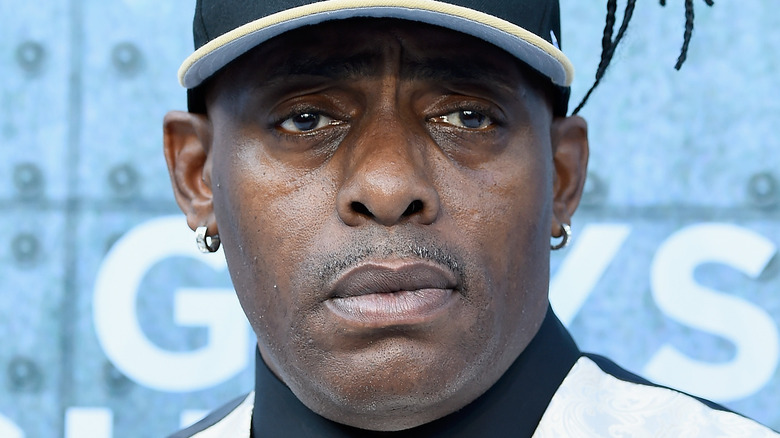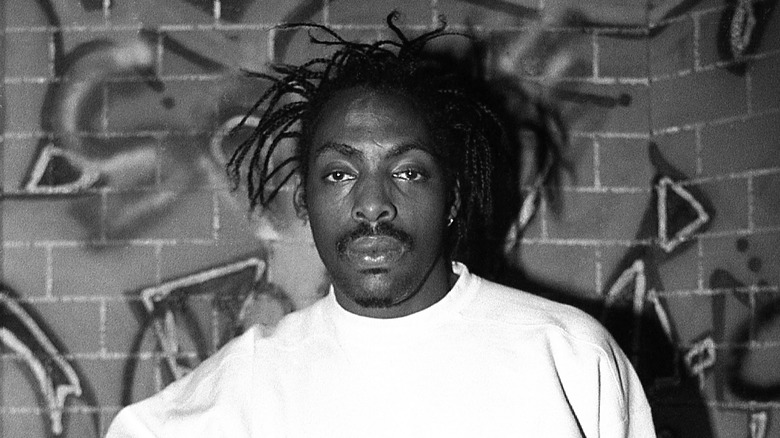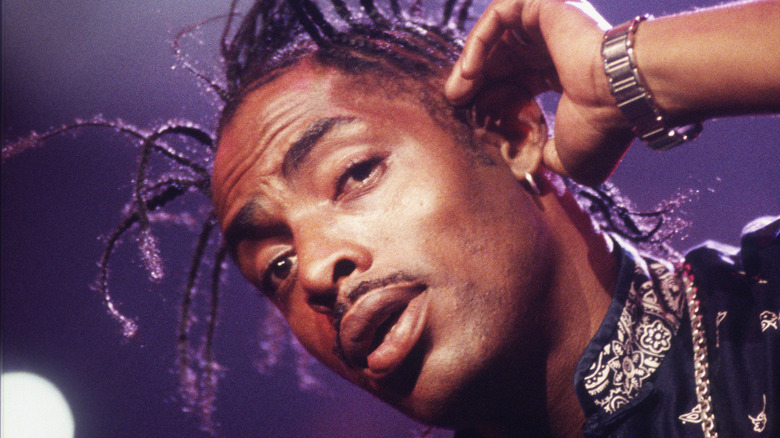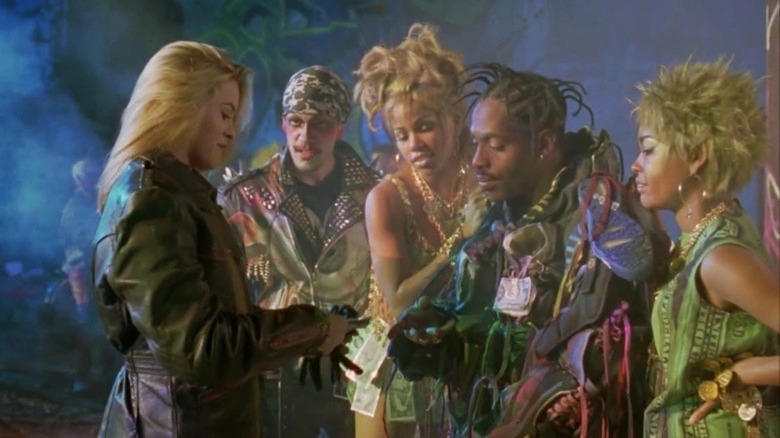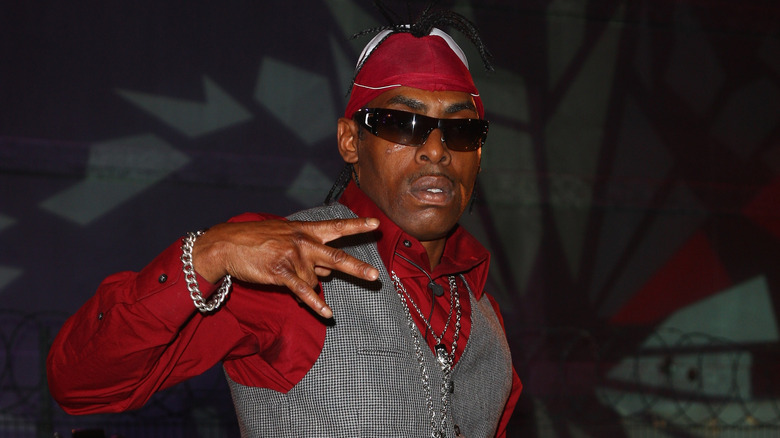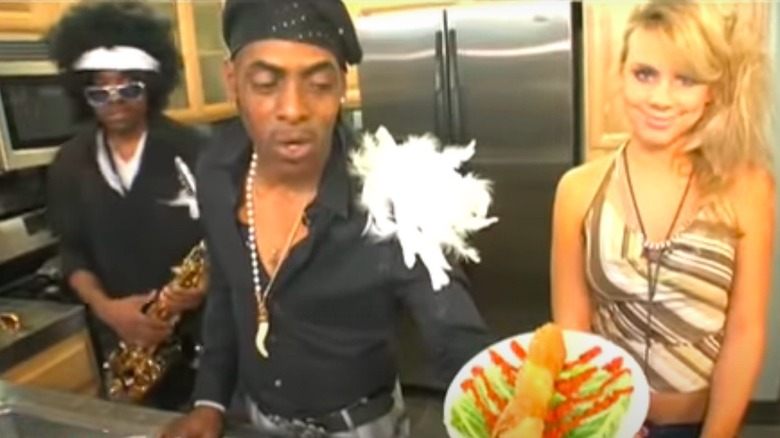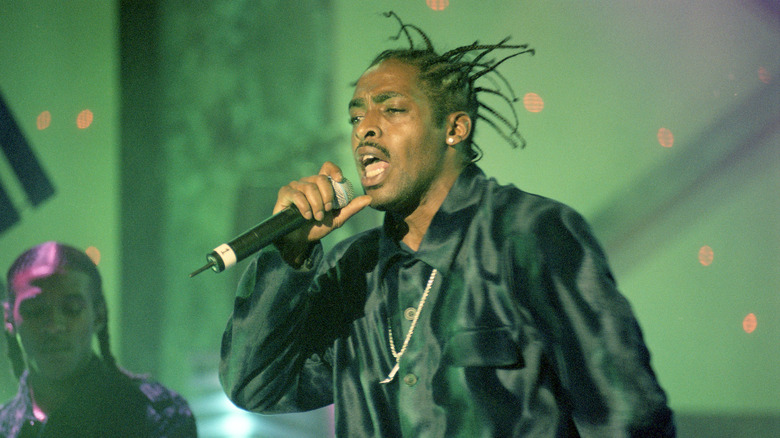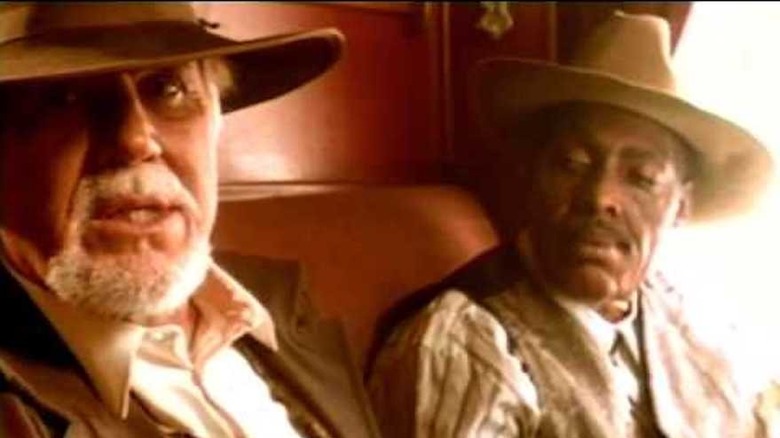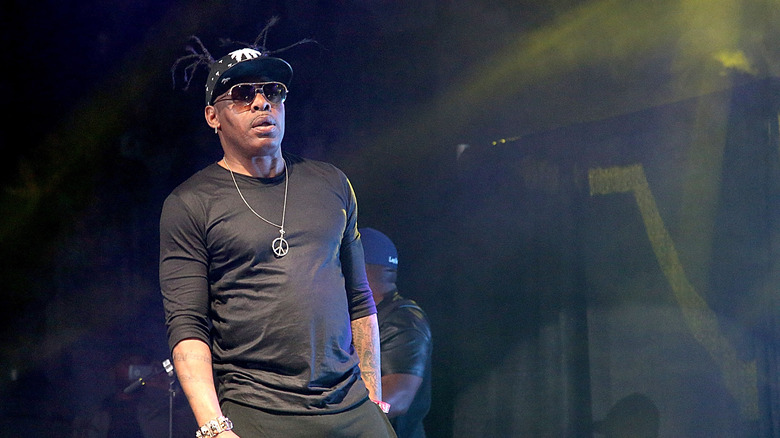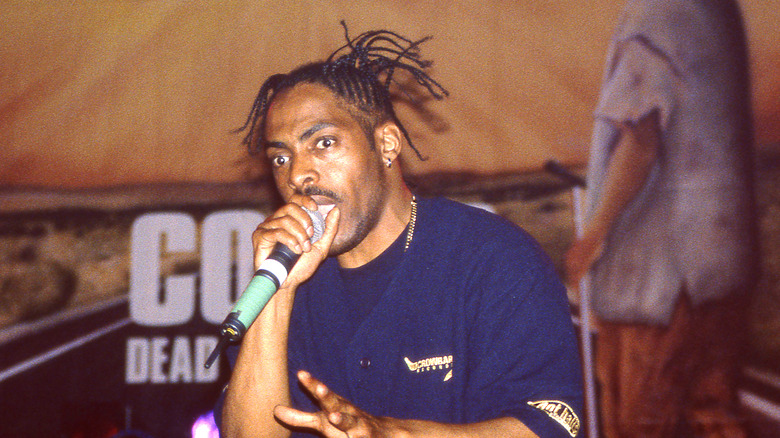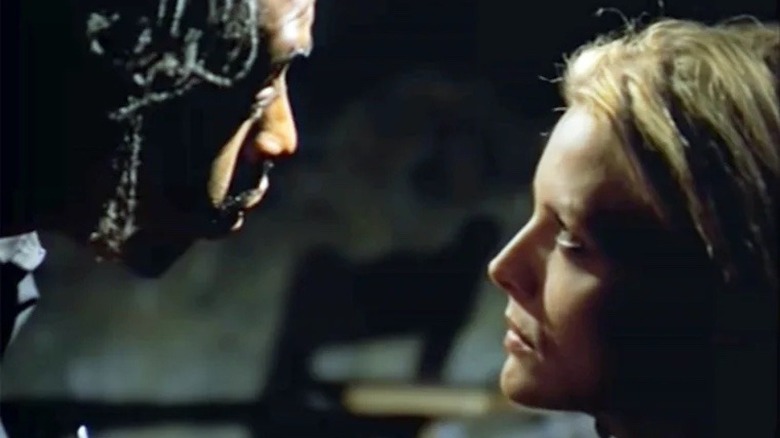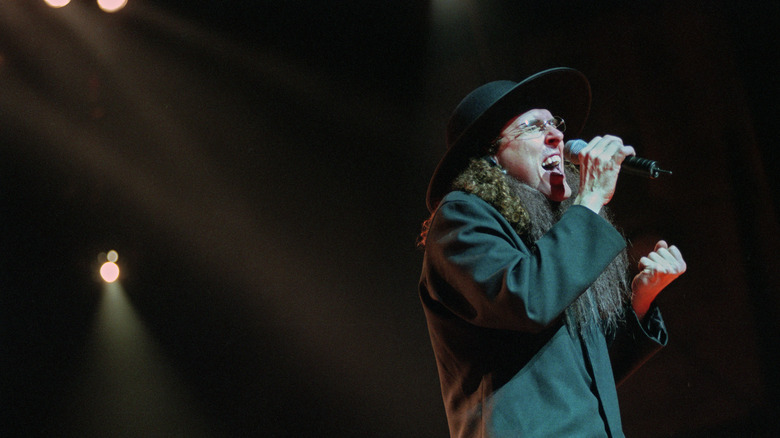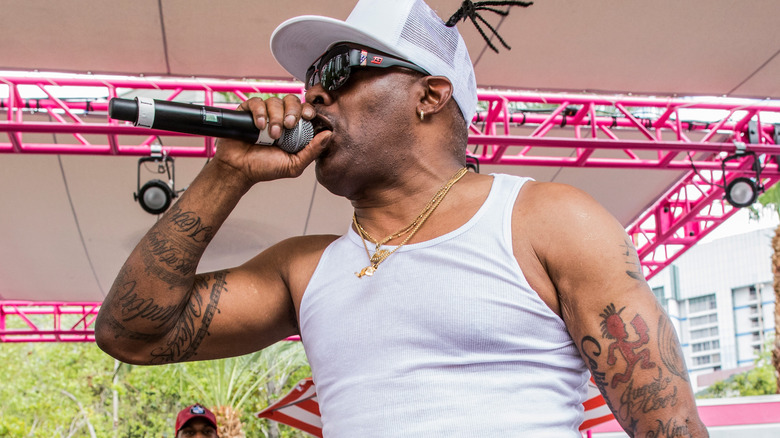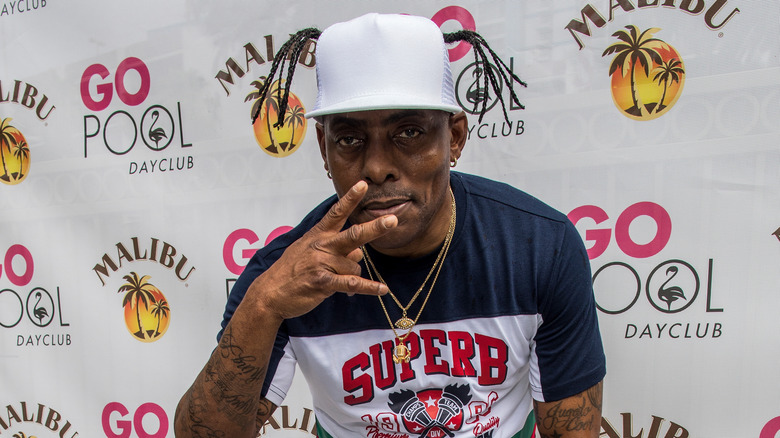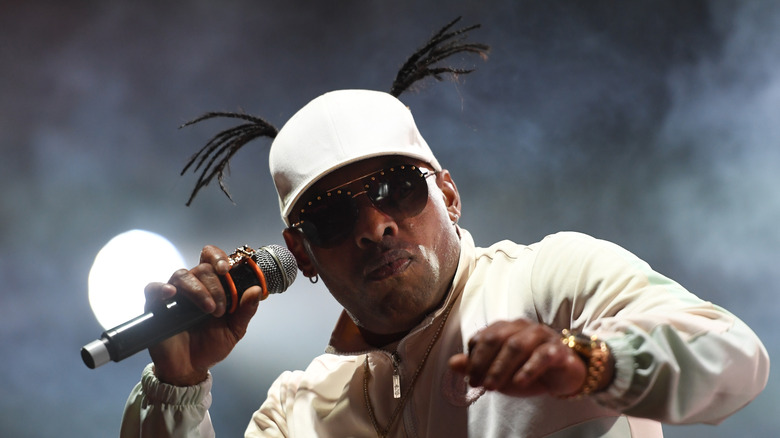What You Never Knew About Coolio
The music world lost a true hip-hop innovator on September 28, 2022, when rapper Coolio died at age 59. "He touched the world with the gift of his talent and will be missed profoundly," said Sheila Finegan, one of Coolio's managers, in a statement to USA Today.
As his obituary in the The New York Times recalled, Coolio was one of the architects of the West Coast rap sound during the 1990s. Born Artis Leon Ivey Jr. in Los Angeles, California, Coolio will be best remembered for his 1995 hit "Gangsta's Paradise," which hit the No. 1 spot on Billboard's Hot 100 and held its position for three straight weeks, ultimately becoming the chart's top song of the year. The track — which was featured in the movie "Dangerous Minds" — also won Coolio his first and only Grammy (he was nominated for six), ultimately reaching triple-platinum status. Other hits included "Fantastic Voyage," from his debut album "It Takes a Thief," and "1, 2, 3, 4 (Sumpin' New)" from his "Gangsta's Paradise" LP.
"I wanna be remembered for just being a cool a** person. And being intelligent," Coolio told Uproxx of the legacy he hoped to leave behind. "If people don't remember my music, my cooking, or my film work, it doesn't matter. I just want people to say ... 'He always tried to educate me. He was always talking about something that was gonna make me a better person.'" To find out more, read on to discover what you never knew about Coolio.
He kicked drug addiction by becoming a firefighter
As a youngster, Coolio grew up in the streets of Compton on the outskirts of Los Angeles, an area that's become notorious for drugs and violence and made infamous in the N.W.A hit "Straight Outta Compton." "The way we was raised in our neighborhood, and the things we was taught, the things that we saw, and were programmed to do ... Man, I should be dead, in jail or on dope," he mused in an interview with the Independent.
As Coolio told Radar Online, he'd become deeply addicted to crack as a teenager, weighing just 100 lbs when his brother, Spoon gave him an ultimatum. "I was a skeleton and Spoon pointed a .38 caliber at my head and told me if I didn't promise to clean up, he would kill me," Coolio said. That led him to a firefighting training program for recovering addicts. "It was the hardest work I ever did," he recalled. "It helped me get my mind back together."
Becoming a firefighter wasn't actually his end goal. "I wasn't looking for a career, I was looking for a way to clean up — a way to escape the drug thing," he told the Los Angeles Times. "[Crack] was going to kill me and I knew I had to stop," he admitted. "It was just what I needed. Routine, order, discipline and a strong physical regimen to toughen me up."
If you or anyone you know needs help with addiction issues, help is available. Visit the Substance Abuse and Mental Health Services Administration website or contact SAMHSA's National Helpline at 1-800-662-HELP (4357).
He collected snow globes but lost them in his divorce
One thing that Coolio's fans may not have known about him was his passion for snow globes. He brought a few snow globes from his extensive collection to be appraised when he appeared on "Donny & Marie" back in 1999. He proved to be quite knowledgeable about his assemblage and each item's provenance. "This is from 1939," he said of one snow globe he displayed on the show, noting the factory that had produced it was no longer in operation. According to the appraiser who examined the item, that one globe was likely worth a few hundred dollars.
Coolio was no dilettante when it came to his collection. As he revealed during that "Donny & Marie" appearance, his collection had swelled to approximately 250 snow globes at that point; he had begun collecting snow globes about six years earlier, he said.
During an interview with Fergal D'Arcy, he was asked about how his snow globe collection was coming along — but revealed he no longer possessed them. "I don't have my snow globes anymore," he declared. "They got taken away from me in my divorce." Speaking of his ex-wife Josefa Salinas, Coolio added, "She convinced the court that they were hers." He did, however, apparently move on to a new hobby. "Now I collect knives and swords," he said, a declaration that may or may not have been a joke.
Coolio maintained a successful acting career
In addition to his music career, Coolio also carved out a sideline as an actor. As his IMDb credits indicated, he was no novice, garnering dozens upon dozens of acting roles. Acting, in fact, was something that Coolio had pursued consistently since the 1990s until the present, from playing himself in a 1995 episode of sitcom "Martin" to three projects that he'd filmed that will be released posthumously.
Among Coolio's many highlights as an actor are a character known as the Banker in the George Clooney-starring "Batman & Robin," two appearances alongside Fran Drescher in "The Nanny" (one as himself, another as a nerdy character named Irwin), Lazarus Demon in "Charmed," accused murder Dante Jackson in Ben Affleck's 2003 "Daredevil," the voice of Kwanzaa-bot in animated comedy "Futurama," and Mr. Wence in TV comedy "Teachers." Coolio really got to demonstrate his range in the 1999 indie film "Tyrone," in which he played triplets: the titular Tyrone, his brother Jerome and their sister Cherone.
Coolio may not have been a trained thespian, but he earned the respect of his fellow actors. "Coolio was a friend and one of the warmest, funniest people I've ever met," tweeted Lou Diamond Phillips, his co-star in the 2003 TV movie "Red Water." "I remember him being nothing but gracious," wrote "Dangerous Minds" star Michelle Pfeiffer (who appeared in his "Dangerous Minds"-inspired video for "Gangsta's Paradise") in an Instagram post.
Coolio also dabbled in reality television
Acting wasn't the only non-musical showbiz sideline that Coolio pursued; he also tried his hand at reality television and game shows. According to his IMDb credits, he appeared on such TV shows as "Fear Factor," "Celebrity Bootcamp," "Pyramid," "Hollywood Squares," "Rachael vs. Guy: Celebrity Cook Off," and "Celebrity Wife Swap." He also appeared twice in the U.K.'s "Big Brother" franchise, "Celebrity Big Brother," in 2009; he proved to be so popular that he was asked back the following year for "Ultimate Big Brother."
He also starred in his own reality show, 2008's "Coolio's Rules." As the series' website explained, the show followed his life as a single dad looking for love while balancing his family life, busy showbiz career and his entrepreneurial exploits. "The Coolio household is full of pitfalls that demand his attention and threaten to derail his business plans," noted the synopsis of the series, which aired on the Oxygen network.
While "Coolio's Rules" only lasted a single season, he had no regrets about his foray into the world of reality television. "It got people to get to know me a little better," he explained in an interview with the Times Herald-Record. "I picked up some new fans off of that."
Coolio hosted his own cooking show and wrote a cookbook
Another of Coolio's passions was cooking, and he wasn't shy about expressing it. When Oxygen canceled "Coolio's Rules" after its debut season, he created a new show as an offshoot, a culinary show he called "Cookin' with Coolio." He also wrote a cookbook with the same name, subtitled "5 Star Meals at a 1 Star Price." As the publisher's synopsis explained, "His recipes are built around solid comfort foods with a healthy twist that don't break the bank."
Speaking with Boston.com, Coolio credited his love of cooking to his mother, and highlighted his unique fusion-style recipes. "I am the Ghetto Gourmet, and my style of cooking is ghetto fusion," he declared. "Instead of saying African-American and Asian, I say Blasian. Instead of saying urban and Italian, I say Ghettalian."
Among his culinary specialties was his signature Fork steak, a cut of beef so succulent that a knife isn't necessary to cut it. He devised the recipe, he wrote in his cookbook, when he moved into a new home and hadn't yet unpacked the dining utensils, realizing he'd be eating a steak with only a plastic fork. "So I thought to myself, 'How can you make a steak so tender you can cut it with a fork?'" he wrote. As he cautioned at the end of his recipe, "If you can't cut it with your fork, it ain't done."
He performed the theme song for a beloved Nickelodeon series
When Nickelodeon launched the 1996 sitcom "Kenan & Kel," the series' opening theme song was written and performed by Coolio. In fact, Coolio also appeared in the title sequence alongside stars Kenan Thompson and Kel Mitchell. To commemorate the 20th anniversary of "Kenan and Kel" in 2016, the show's stars spoke with Entertainment Weekly and revealed how they managed to nab Coolio to create the theme song, "Aw, Here It Goes," referencing one of Mitchell's most popular catchphrases when he starred in Nickelodeon sketch comedy series "All That."
"It was the best," said Thompson of the song. "[Coolio] had been on 'All That' before at that point, so we felt like we knew him. That's how you are when you're young, 'Oh yeah, Coolio's my best friend.'" Meanwhile, Mitchell contended that the song has stood the test of time, and remained a favorite with fans. "That hook, the song still holds up today," Mitchell said. "When I do [comedy] shows I'll play the 'Kenan & Kel' theme song and come out to the stage to that or I've even been in the club and they play it."
After Coolio's death, Mitchell paid tribute on Instagram, sharing what the rapper had told him when they last talked. "Last thing you told me when we last spoke a few months ago you told me you loved how I keep things positive and to keep doing that," Mitchell wrote.
He once collaborated with a country music legend
Throughout his decades-long music career, Coolio collaborated with a variety of artists, ranging from Ice Cube to Janet Jackson. Arguably his most out-of-left-field collab, however, had to be "Hustler," his 2003 duet with iconic country music star Kenny Rogers. Inspired by Rogers' crossover mega-hit "The Gambler," the track not only included Rogers' vocals, but also featured him extensively in the music video.
As for how these two came to work together, Coolio told MTV News that he'd long been a fan. "I've always listened to his songs and I've always liked 'The Gambler,' that's like one of my favourite country songs," he explained. While he admitted he wasn't much of a country music aficionado, there were a few Nashville artists who had managed to capture his attention. "But back in the days, all I knew was Kenny Rogers, Johnny Cash, Willie Nelson. I didn't really know anybody else, you know," he explained.
Rogers also discussed why he wanted to collaborate with Coolio on the new update of his classic hit. "'The Gambler' song is really more than a song," Rogers said, "it's about a way of life, and I think they wanted to take that and kind of exploit the concept. That there are times when you need to back off, you know, and really look at where you are, and not take it so much as a country song, but a statement of life."
Coolio narrowly avoided prison for a 2016 gun charge
In 2016, Coolio was arrested at LAX when a gun was found in his carry-on bag while going through security on his way to catch a flight. He was charged with one felony count, for being a felon in possession of a firearm. According to Associated Press, via CBS News, he was facing a potential prison sentence of three years due to his prior convictions, one in 2001 for carrying a concealed weapon in a vehicle and another in 2009 for cocaine possession. After posting bail, reported CBS Los Angeles, Coolio shared a video on social media in which he addressed what he referred to as "the little misunderstanding at the airport today."
He managed to dodge prison time by entering a guilty plea to a lesser charge, carrying a concealed weapon (a misdemeanor), reported Reuters. In his plea deal, Coolio was sentenced to three years' probation and ordered to perform 45 days of community service.
The judge issued a stern warning, telling the rapper that if he was caught with so much as one bullet he'd be heading straight to the slammer. Coolio, however, continued to insist the whole thing was simply a mixup. "It was a misunderstanding," he explained. "I do not condone the use of firearms, legal or illegal. Thanks to the court and the attorneys handling this for me so I can still do the work that I do."
Coolio was tapped to be a climate change educator
In 2008, Coolio took on a whole new role when he was tapped to participate in a bold education initiative aimed at teaching Black college students about climate change. According to a press release, Coolio and jazz saxophone player Jarez were was among the artists chosen to be spokespeople for a new campaign launched by the organization Environmental Justice and Climate Change (EJCC). The intent, the release noted, was to educate students who were attending historically Black Colleges about the climate crisis.
"Our goal is to engage a diverse group of Black youth in the fight for climate justice," said EJCC director Nia Robinson in a statement. "Whether they're old school hip-hop fans, jazz enthusiasts, or among the neo-soul crew, we want them focused on climate change. EJCC is pleased to have Coolio and Jarez reaching out to their base to promote environmental sustainability."
Interestingly enough, just one year after Coolio's educational endeavor, he appeared on "Celebrity Big Brother" and engaged in a discussion about climate change with a fellow celeb, British TV presenter Terry Christian. As The Guardian reported, Coolio took a somewhat baffling stance given his association with EJCC. While Christian blamed industrialization and the destruction of the Earth's ozone layer, Coolio offered a different opinion. "We're coming to the end of an age," Coolio declared. "We're coming into a water age, brother. The age of Aquarius."
Why Michelle Pfeiffer was nervous filming Coolio's Gangsta's Paradise music video
"Gangsta's Paradise" was Coolio's biggest hit, and will always be associated with the movie "Dangerous Minds." According to Rolling Stone's oral history of the movie, Antoine Fuqua was tapped to direct the song's music video, which partnered Coolio and the film's star, Michelle Pfeiffer. Getting Pfeiffer to participate in the video was Fuqua's idea, although he didn't think she'd actually go for it. "I couldn't believe she said yes ... Her and Coolio had fun shooting the video, I believe. It was a great experience for me, as well," said Fuqua.
"Michelle was kind of nervous, because I don't think that, up to that point, she'd ever been around that many Black people in her life," Coolio added with a laugh. He remembered that he enjoyed working with Pfeiffer during the shoot, although once filming completed she didn't stick around. "But we had a good time," he recalled. "She came out and did her thing, and she killed it; it took her two takes to do her parts, and she was outta there."
In addition to the role it played in garnering attention for the movie, the "Gangsta's Paradise" video was also something of a watershed moment for rap. "The song also showed that gangster rappers could work with Hollywood's elite, and promote a film starring a white actress," hip hop journalist Soren Baker told Rolling Stone.
He wasn't originally a fan of Weird Al Yankovic's Amish Paradise
One of the stranger chapters in the history of Coolio's "Gangsta's Paradise" was the time that song parodist "Weird Al" Yankovic spoofed it. In Yankovic's version, Amish farmers were substituted for urban gang members in "Amish Paradise." Yankovic also parodied Coolio's interaction with Michelle Pfeiffer in the music video, with "Brady Bunch" mom Florence Henderson standing in for Pfeiffer. While Antoine Fuqua, who directed the "Gangsta's Paradise" video, saw a "Weird Al" parody as a positive thing, a reflection of the original's success, Coolio felt differently. "Coolio didn't like it," rapper L.V., who collaborated with Coolio on the track, told Rolling Stone. "I'm still truly sorry that it upset Coolio so much at the time," Yankovic told the magazine.
Looking back at the whole brouhaha, Coolio regretted publicly denouncing "Amish Paradise." "I have to say, that was probably one of the least smart things I've done over the years," Coolio candidly told Rolling Stone of his initial hatred for the song parody. "I should have never been upset about that," he added, pointing out that superstars such as Michael Jackson and Prince took no offense when Yankovic famously parodied their hits. "I should have embraced it like everybody else did," Coolio conceded.
Coolio ultimately wound up apologizing to Yankovic, but was still kicking himself. "That was one of the dumbest things I did in my career," Coolio reiterated in an interview with Yahoo! Entertainment.
The truth about Coolio's Insane Clown Posse tattoo
Like many rappers, Coolio adorned his body with multiple tattoos. One of these appeared on his left bicep, a tribute to rap group Insane Clown Posse. As it happened, Coolio toured with ICP — and even joined the group twice for their infamous Gathering of the Juggalos music festival, arguably among the most outrageously raucous music-related events ever staged. "They adopted me," Coolio said of ICP in an interview with Vice.
Coolio also took the opportunity to set the record straight about the tattoo, which reads "Jugalo Cool," after TMZ reported that Coolio's tattoo artist had posted an epic fail when he botched the tat by misspelling the word "Juggalo." "No, I didn't misspell it, bro! That's the thing," Coolio insisted. According to Coolio, the one-G "jugalo" was his nod to the hip hop tendency to intentionally misspell words to gin up street cred — say, gangsta for gangster, or shawty for shorty. "I took the 'g' out of 'Juggalo' because there's only one motherf**king G, and that's me. I didn't need two Gs to describe my Juggalo," Coolio defiantly declared to Vice.
Coolio made it abundantly clear that he was displeased with TMZ's report. "TMZ tried to clown me and s**t," he complained to Vice. "Look, they don't know s**t about my culture and about my art and about where I'm coming from. How can they f**king judge me anyway?"
He was particularly popular in Kazakhstan
In Coolio's 2014 interview with Vice, the interviewer pointed out that the rapper had developed quite the following in Kazakhstan. The question likely sprang from Coolio's appearance at Kazakhstan's London Grad nightclub the previous year, with his performance of "Gangsta's Paradise" in front of a club full of adoring Kazahk fans documented on video.
"I'm big everywhere! Except at home. I mean, I'm pretty big at home, it's just that people kind of forgot how big I am," said Coolio of how his fame stateside compared to how he was greeted in the ancestral homeland of make-believe journalist Borat Sagdiyev, comic creation of Sacha Baron Cohen.
In fact, Coolio told Rolling Stone, Kazakhstan was just one of many international locales where the success of "Gangsta's Paradise" had opened doors to visit some far-flung and off-the-beaten-path countries throughout the planet. "It solidified me in the rest of the world," Coolio said of the song's enduring blockbuster success. "It guaranteed that I could tour well into my sixties, if I wanted to. It's been very good for me, very lucrative, and it's gotten me to places that most rappers, no matter how big they get, they'll never go to some of the places that I've been to. You'll never see a Fetty Wap or a Future going to Pakistan or Uzbekistan, you know?"
Coolio's net worth when he died may prove surprising
When Coolio died, he left behind somewhere between six and 10 children; as The Sun noted, he fathered multiple kids with a variety of women, with four of his kids shared with his ex-wife, Josefa Salinas. According to Celebrity Net Worth, the inheritance left for his progeny likely won't amount to as much as his fans may think; the late rapper's estimated net worth at the time of his death was just $1.5 million.
In retrospect, that shouldn't be surprising given Coolio's thoughts on his contemporaries who strive to make millions in the music business. As he once explained (via People), the fact that he was doing what he was doing was irrelevant when it came to whether or not he was doing it to get rich. "I was rapping for me. If I'm rapping for money or not rapping for money, what f***ing difference does it make if I like what I'm doing?" he said.
Besides, he said, making money was never his primary motivation for making music; there are far easier ways to earn a fortune than being a rapper. "I disagree with people doing something like this just for money," he explained. "If you want money, go be a lawyer. If you want money, go play the stock market. You'll make money faster than you do in hip-hop."

